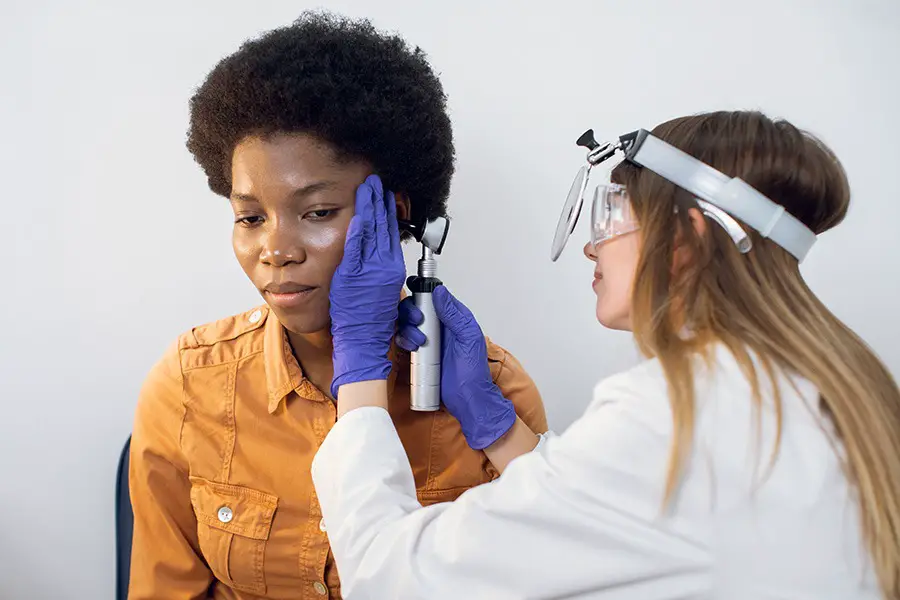Understanding the Link: Meningitis and Hearing Loss
Navigating life after a health crisis like meningitis is a challenge, made even more complex when paired with complications like hearing loss. This intricate correlation between meningitis and hearing loss is often misunderstood, leaving many survivors unprepared for the resulting auditory challenges. This post aims to demystify the relationship between these two health issues, providing comprehensive insights into the physical, emotional, and social implications of living with hearing loss post-meningitis.
Navigating Life Post-Meningitis
Hearing loss after meningitis is more than a mere physical challenge; it necessitates a complete reorientation of one’s lifestyle, relationships, and self-perception. Our mission in this post is to share practical strategies and tips to enhance the quality of life for survivors and their support networks. We delve into coping mechanisms, social strategies, and the importance of maintaining strong relationships, all key aspects of managing life with hearing loss post-meningitis.
The Power of Knowledge
Understanding the scientific basis of meningitis-induced hearing loss is crucial for healthcare professionals and those affected alike. This post unravels the medical complexities of the condition, from the role of inflammation in the inner ear to the potential for varying degrees of hearing loss. With ongoing research and promising advancements on the horizon, a more hopeful future beckons for those affected.
Taking Charge of Your Health
Early detection of meningitis and its associated hearing loss can be pivotal for mitigating long-term complications. We discuss the importance of routine check-ups, symptom recognition, and prompt treatment. This introduction to a complex journey towards improved hearing post-meningitis is intended to empower survivors and their support systems with knowledge and strategies to better navigate this intricate and often misunderstood health challenge. Join us as we unravel the mystery of meningitis and hearing loss.
Adapting to Life Post-Meningitis: Tactics and Approaches
Enduring hearing loss post-meningitis can be daunting, yet the implementation of effective adaptation methods can considerably enhance your quality of life. One such approach involves being proactive in managing your hearing health by familiarizing yourself with your condition, exploring innovative treatment options, and advocating for your requirements.
Maintaining robust relationships is another pivotal adaptation method. Cultivating bonds with friends, family, and support groups can furnish you with invaluable emotional support and practical suggestions. Sharing your experiences and gleaning knowledge from others who have encountered similar hurdles can mitigate feelings of solitude and instill a sense of empowerment.
The Unseen Challenge: Life with Hearing Loss from Meningitis
The difficulties of living with hearing loss due to meningitis may often seem invisible to those in your environment. While loved ones may acknowledge your meningitis diagnosis, they might not fully comprehend the influence that hearing loss has on your everyday life. Communicating your requirements and challenges to your support system, educating them about the specific hurdles you encounter is critical.
By candidly discussing your hearing loss and the adjustments you need, you can help cultivate a more inclusive atmosphere that caters to your needs. Moreover, associating with others who have experienced hearing loss from meningitis can provide valuable insights and encouragement, reinforcing that you are not alone on this journey.
Decoding the Relationship: Meningitis and Hearing Loss
Recognizing the correlation between meningitis and hearing loss is critical for both healthcare providers and those afflicted by the condition. The infection can instigate inflammation in the inner ear, which may harm the delicate hair cells responsible for transmitting auditory signals to the brain. This harm can result in varying levels of hearing loss, from mild to profound. Moreover, hearing loss due to meningitis can be temporary or permanent, contingent on the severity of the infection and the efficacy of the treatment.
Continued research aims to devise new treatments and interventions to prevent or reverse hearing loss due to meningitis. These advancements harbor immense potential to enhance the lives of those impacted by this condition, providing hope for a future with improved hearing and overall health.

Decoding Silence: An Analytical View on the Advances in Conductive Hearing Loss Research and Treatment
This analytical article sheds light on conductive hearing loss, offering an in-depth exploration of its genetic factors, treatment advances, and promising experimental therapies.

Embracing the Melody of Life: Navigating the Journey with Conductive Hearing Loss
A blog post delving into the experiences and challenges of living with conductive hearing loss, discussing its impact on everyday life, social interactions, mental health, and the potential benefits of hearing aids and cochlear implants.
Meningitis and Hearing Loss: The Need for Prompt Identification
Immediate identification of meningitis and its accompanying hearing loss is vital for mitigating the risk of long-term complications. If you suspect that you or someone close to you may have meningitis, seek medical help instantly. Symptoms can encompass fever, headache, stiff neck, vomiting, and sensitivity to light. In infants, symptoms may manifest as irritability, lethargy, and a bulging fontanelle (the soft spot on the head).
Post-diagnosis and treatment of meningitis, it’s crucial to monitor your hearing for any alterations or anomalies. Schedule routine appointments with an audiologist to evaluate your hearing and detect any potential hearing loss promptly. Early intervention can enhance the probability of preserving your hearing and prevent further complications.
The Path to Improved Hearing Post-Meningitis
The journey towards improved hearing after meningitis can be arduous, but with the right resources and support, overcoming these barriers is achievable. Treatment alternatives for hearing loss due to meningitis may encompass hearing aids or cochlear implants, contingent on the severity of your hearing loss. These devices can significantly enhance your ability to communicate and engage with your environment.
Alongside medical interventions, rehabilitation services like speech therapy, auditory training, and counseling can play a critical role in your journey to better hearing. Collaborating with a team of committed professionals, you can cultivate the skills and strategies needed to flourish in a world of sound.
Sound Oasis® Bluetooth® Tinnitus Sound Therapy System®
Discover the ultimate solution for managing tinnitus with Play. This innovative device offers you 20 meticulously crafted built-in sounds, specifically recommended by esteemed audiologists worldwide. Dive into a world of soothing melodies and find respite from the challenges of tinnitus.
Immerse yourself in an audio oasis with Play’s integrated Bluetooth technology. Stream your favorite sounds or music wirelessly with a Bluetooth range of up to 30 feet (10 meters). Experience the freedom of wireless connectivity as you create your own personal sanctuary of sound.
Enhance your relaxation journey with the Sound Oasis Professional Tinnitus Frequency App, included with Play. Immerse yourself in a diverse range of calming sounds meticulously designed to alleviate tinnitus symptoms. Unwind, find serenity, and embark on a path towards improved sleep with this powerful companion.
Enjoy uninterrupted tranquility with Play’s versatile power options. Utilize the built-in rechargeable battery, providing you with 4-5 hours of continuous use per charge. Alternatively, keep Play plugged in using the included charging cable for extended periods of blissful sound. Dive into the soothing world of Play and experience the transformative benefits it brings to managing tinnitus.
Navigating Life with Meningitis-Induced Hearing Loss
Living with hearing loss after surviving meningitis can be a challenging journey. This blog post elucidates on coping strategies and resources that can significantly enhance the quality of life for survivors. It highlights the importance of becoming an active participant in one’s hearing healthcare, seeking the latest treatment options, and advocating for personal needs. Building strong relationships with family, friends, and support groups are also emphasized as crucial steps in managing life post-meningitis.
The Invisible Battle: Meningitis-Related Hearing Loss
Meningitis-related hearing loss often poses an ‘invisible struggle’ that can be misunderstood by those around the survivors. This post underscores the importance of open communication about the challenges and accommodations needed, fostering an inclusive environment. It also accentuates the value of connecting with others with similar experiences, to gain valuable insights and encouragement.
Unearthing the Meningitis and Hearing Loss Connection
The relationship between meningitis and hearing loss is explored in-depth in this post. It sheds light on how the infection can lead to inflammation in the inner ear, damaging the hair cells responsible for transmitting sound signals to the brain. It further discusses the ongoing research aiming to develop new therapies and interventions that can help prevent or reverse meningitis-related hearing loss.
The Path to Improved Hearing Post-Meningitis
Early detection of meningitis and its associated hearing loss is critical to reducing long-term complications, as emphasized in this blog post. It also outlines the treatment options for meningitis-related hearing loss, which may include hearing aids or cochlear implants. Rehabilitation services and a dedicated team of professionals can support a survivor’s journey to better hearing, fostering the development of skills and strategies to thrive in a hearing world.
In conclusion, understanding the complex link between meningitis and hearing loss and the best possible care can help improve overall quality of life. This post serves as a comprehensive guide for individuals affected by meningitis-related hearing loss and their support network, emphasizing the power of knowledge, early detection, effective treatment, and a strong support system.





